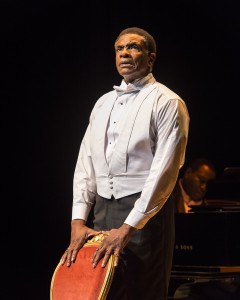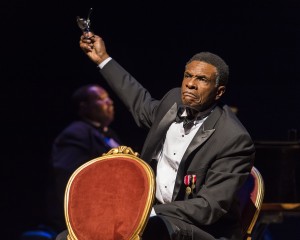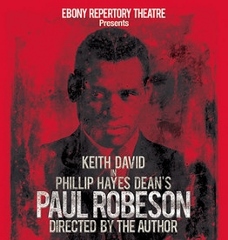PROMETHEUS BOUND
In a production as stately and reverent as its subject was startling and rebellious, Philip Hayes Dean has directed his own one-man-with-musical-accompanist play to a standstill. I don’t know how you’d do this if you wanted to: to reduce a renaissance man like Paul Robeson to the dusty subject of a mediocre history lecture, especially when you’ve hired an actor as exciting as Keith David to give the speech. But it has happened, and through April 20 you can see it at Ebony Rep.
 A black All-American football player (fathered by an escaped slave!) who graduated valedictorian from Rutgers in the nineteen teens – yes – and then got a law degree from Columbia while playing in the NFL, and then went on to have a storied international theatrical, film, and music career, who palled around with Sergei Eisenstein and Albert Einstein, who hobnobbed with the British aristocracy and the Soviet proletariat, who flew to the front lines of the Spanish Civil War and nearly got himself lynched in upstate New York, who had a years-long affair with the extremely white Peggy Ashcroft that almost broke up his marriage, who advocated revolt in colonial Africa, who wrangled with the House Un-American Activities Committee and had his livelihood taken away for sticking to his political convictions during America’s second Red Scare, who found those same convictions tested along with his conscience when he decided to protect the Soviet image by keeping secret his first-hand knowledge of Stalinist purges: surely this is a dynamic figure! For God’s sake, there must be a drama to be written around such a man.
A black All-American football player (fathered by an escaped slave!) who graduated valedictorian from Rutgers in the nineteen teens – yes – and then got a law degree from Columbia while playing in the NFL, and then went on to have a storied international theatrical, film, and music career, who palled around with Sergei Eisenstein and Albert Einstein, who hobnobbed with the British aristocracy and the Soviet proletariat, who flew to the front lines of the Spanish Civil War and nearly got himself lynched in upstate New York, who had a years-long affair with the extremely white Peggy Ashcroft that almost broke up his marriage, who advocated revolt in colonial Africa, who wrangled with the House Un-American Activities Committee and had his livelihood taken away for sticking to his political convictions during America’s second Red Scare, who found those same convictions tested along with his conscience when he decided to protect the Soviet image by keeping secret his first-hand knowledge of Stalinist purges: surely this is a dynamic figure! For God’s sake, there must be a drama to be written around such a man.
 This isn’t it. Dean has not deigned to include much from the biographical sketch above. The play’s an oleaginous comfort food. We hear a lot about how much Robeson loved his preacher father, and how it wasn’t exactly easy to get past the racism at college, but that it was apparently very easy to become among the most popular entertainers of the 1930s. His marriage is described as uniformly happy. A few political adventures are referenced but not described, not lived. It is as if the author wished to rob his subject of his titanic breadth, without supplying any corresponding revelation about his humanity – so he’s just a regular, upstanding guy who happens to possess superhuman qualities. All the conflict in this play is external: the authorities just wouldn’t let him be him. The passion, the rage that made Robeson such an explosive, divisive figure, has been written out. This is not only not the real story, it’s no story. Why then is it so long? When has any monologue taken so long to say so little?
This isn’t it. Dean has not deigned to include much from the biographical sketch above. The play’s an oleaginous comfort food. We hear a lot about how much Robeson loved his preacher father, and how it wasn’t exactly easy to get past the racism at college, but that it was apparently very easy to become among the most popular entertainers of the 1930s. His marriage is described as uniformly happy. A few political adventures are referenced but not described, not lived. It is as if the author wished to rob his subject of his titanic breadth, without supplying any corresponding revelation about his humanity – so he’s just a regular, upstanding guy who happens to possess superhuman qualities. All the conflict in this play is external: the authorities just wouldn’t let him be him. The passion, the rage that made Robeson such an explosive, divisive figure, has been written out. This is not only not the real story, it’s no story. Why then is it so long? When has any monologue taken so long to say so little?
 Keith David is directed to walk a familiar pattern between two sets of chairs. He talks, sits, rises, sings, does a little soft-shoe, as if afraid to get too worked-up before bed-time. (Granted, his knee hurts – the production was postponed a week due to injury. But this show’s problems are much bigger than any knee.) Upstage, at the gaudiest available Steinway grand, Byron J. Smith plinks and croons delicately, soporifically. And after the time it takes to watch a full production of Showboat, the audience leaps to its feet because such a subject deserves some enthusiasm, if not from the production then perhaps from the hoi polloi. Somehow this play got produced three times on Broadway. From L.A., I cannot tell you why.
Keith David is directed to walk a familiar pattern between two sets of chairs. He talks, sits, rises, sings, does a little soft-shoe, as if afraid to get too worked-up before bed-time. (Granted, his knee hurts – the production was postponed a week due to injury. But this show’s problems are much bigger than any knee.) Upstage, at the gaudiest available Steinway grand, Byron J. Smith plinks and croons delicately, soporifically. And after the time it takes to watch a full production of Showboat, the audience leaps to its feet because such a subject deserves some enthusiasm, if not from the production then perhaps from the hoi polloi. Somehow this play got produced three times on Broadway. From L.A., I cannot tell you why.
photos, courtesy of Ebony Rep, by Craig Schwartz
Paul Robeson
Ebony Rep
Nate Holden Performing Arts Center
4718 West Washington Boulevard
scheduled to end on April 27, 2014
for tickets, call 323-964-9766 visit www.ebonyrep.org

{ 1 comment… read it below or add one }
We’re not talking about a man who crossed paths with the higher echelon of the world. We are talking about a man who came to terms with the man as an entity. A man who set his sails on the great waters of the world and learned the injustice that man plays against his fellow man through his education and his artistic talents; and who realized that those talents were being used to serve those that had, not those that had not, and utilized those talents to raise the awareness of the multitude of all mankind. If he were a man who valued acclaim, he might have attended his 75th birthday, but he served the world, not to be served. Keep it simple. Keep it sweet. Make the understanding a simple treat. Childlike but not childish. You hold in your hands the power of influence. For that service? Choice my friend. In the beginning not the end.